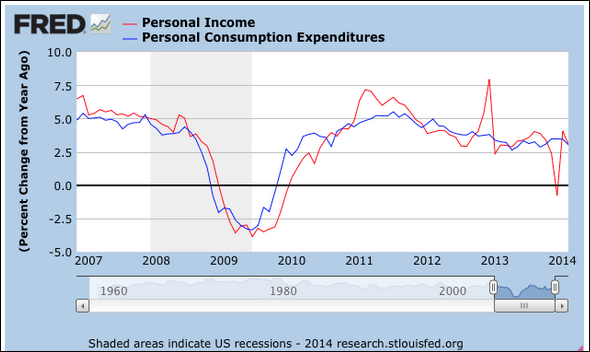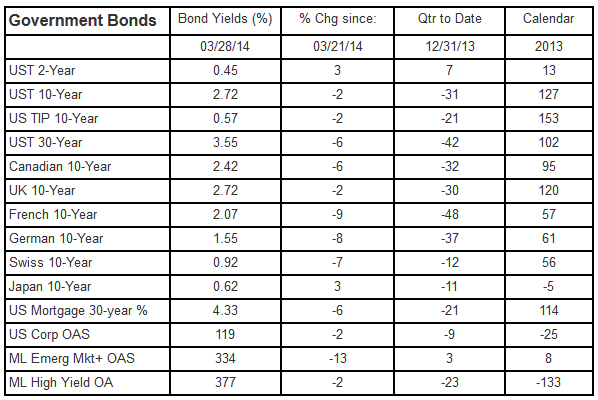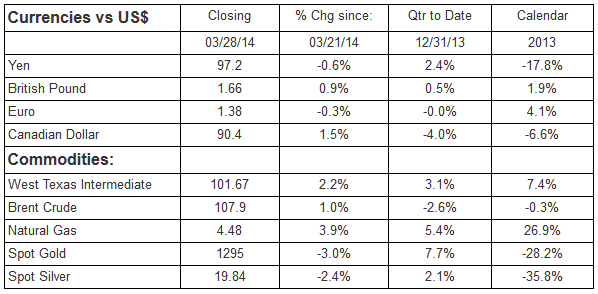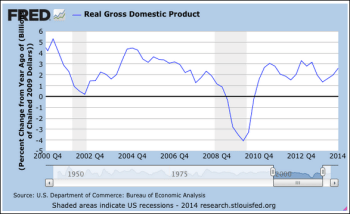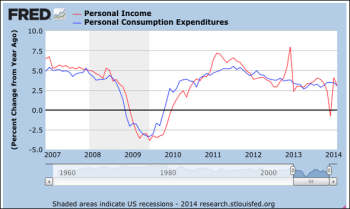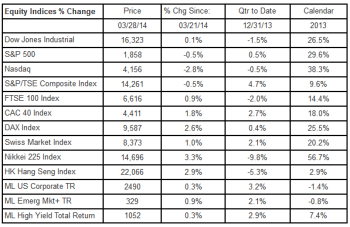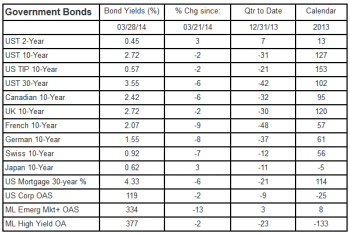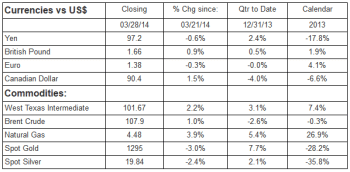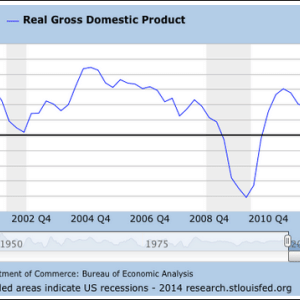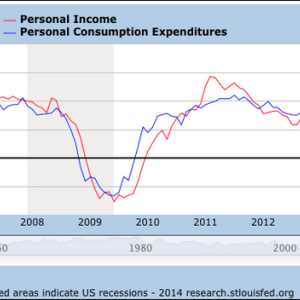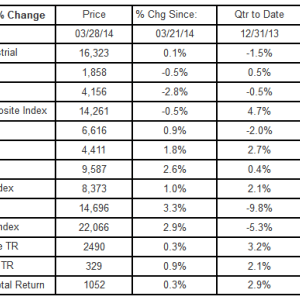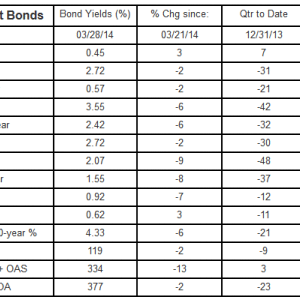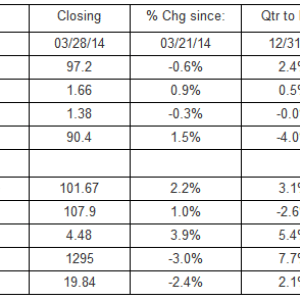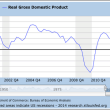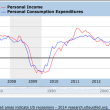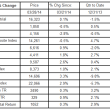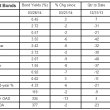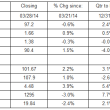John Davidson’s Economic Comments: Week ending March 28
Stronger economic data from Europe took the spotlight this week. Although the U.S. remained under uncertain influence from severe weather, its releases displayed resilience in the U.S. economy. European and Asian equity markets rallied; U.S. stocks were mixed on the week. Bond yields fell, credit spreads narrowed and the yield curve flattened (an increase in short-term rates and a decline in long-term rates.) The U.S. dollar was mixed, energy prices were higher, and metals commodity prices were lower on the week.
Perspective:
Watching the March Madness NCAA basketball tournament the past few days, I have been impressed with the athleticism and extraordinary team-play on the basketball court; but, the experience has caused me to question the experts who created the ranking in the brackets. Sixty-four teams are ranked into four brackets with each bracket having rankings from 1 to 16. The rankings took into account the season's wins, losses and strength of the opponents.
In this single elimination tournament, the 64 teams have played several rounds that have resulted in the emergence of a single victorious team in each of the four brackets. Yet, of the successful teams, only one of the four was ranked first in its bracket; and, a second was ranked second, but the other two teams were ranked seventh and eighth (ie in the middle) in their respective brackets. Warren Buffet had sufficient skepticism about the ability of anyone to pick the winners that he offered a $1 billion challenge; the tournament is not over and, yet, none of those who submitted brackets were without an error.
This should give us a healthy dose of skepticism about advice we get from experts in other areas. Monday will be the final day in the first quarter of 2014. So, the quarter-to-date returns in the tables below may not reflect the full quarter's returns, but they are only shy of one day's returns. As with March Madness, you may discover some surprises in what you had expected for the first quarter. Did you expect ML credit indices to out-perform U.S. stocks? Did you expect that the S&P 500 would outperform the Nasdaq? What about going forward? What are my best guesses for the remainder of 2014 in the financial markets? There will be some surprises...
Economic Releases:
In its third revision, the U.S. GDP grew at a 2.6% rate (quarter over quarter at a seasonally adjusted annual rate) in the fourth quarter. This was two ticks higher than the most recent revision, but a tick less than consensus. Prices were well contained and unrevised at 1.6% Q/Q, SAAR. The chart below shows GDP rose 2.5% on a year-over-year basis (YOY) in the fourth quarter. The recent -4.0% decline in 2010 was the most severe annual contraction in GDP since World War II.
In February, U.S. Personal Income (red in the chart) and Consumption Spending (blue in the chart) both rose +0.3%. On a YOY basis Personal Income rose 3.1% while Consumer Spending rose 3.0%. Inflation remained well contained, only +0.1%,
Other Economic Releases
This week's releases of the Markit Flash Purchasing Managers' Indices and Initial Jobless Claims provided insights into next week's releases of PMI's and the U.S. Employment Report. The weekly Initial Jobless Claims fell to 311,000 the week of March 22; the four-week average dropped to 317,750. Continuing Claims fell 31,000 to 2.863 million. Markit's PMI Manufacturing Index Flash for March fell a point to 55.5. The PMI for Services Flash rose 3 points to 55.5. Both remained well inside the expansion zone. New Orders for Durable Goods rose 2.2% in February; ex-transportation, Durable Goods only rose +0.2%.
The Markit PMI's Flash reports for the European Union were higher for the Composite and Services, but flat for Manufacturing; at 53.2, 53.0, and 54.4 all were in the expansion zone for March. Similarly, the EU's Economic, Industrial and Consumer Sentiment survey's all showed improvement for March. Germany's PMI Flash reports were lower in March, but all (Composite, Manufacturing and Services) were well into the expansion zone. Germany's Ifo Surveys were better for Current Conditions, but lower for Economic Sentiment and Business Expectations in March. France's Flash PMI's all moved from contraction to expansion, 51.6, 51.9, and 51.4 for the Composite, Manufacturing, and Services. The UK's final Q4 GDP report remained unrevised at +0.7% from the previous quarter (not annualized as U.S. numbers are reported). UK Retail Sales rose 1.7% in February.
The Unemployment Rate in Japan slipped a tick to 3.6% and the CPI was unchanged in February.
Equities Markets:
Stronger economic data gave European and Asian stocks a boost, but U.S. equities were mixed on the week. On a QTD basi,s Asian stocks declined, but U.S. and European stocks were mixed. Bond credit markets benefited from narrowing spreads and falling Bond yields. The ML Credit indices bested most equity markets with one day left to go in the first quarter.
Bond Markets:
Government Bond yields were mostly lower, and the yield curve flattened as longer term bonds out-performed. Credit spreads narrowed on the week. On a QTD basis the same was true: flattened yield curve, lower bond yields and tighter credit spreads (with the exception of emerging markets).
Currencies & Commodities:
The U.S. dollar was mixed; it rose against the Yen and Euro, but fell against the Euro and Looney on the week. Energy prices rose, but metals commodity prices fell on the week. On a QTD basis, the dollar gained against the Looney, but fell against the Yen and Pound; commodity prices rose with the lone exception of Brent Crude.
John W. Davidson, CFA, started writing these Comments more than a decade ago as a personal discipline when he was promoted from portfolio manager to chief investment officer and CEO.

Most recently, he was the president of PartnerRe Asset Management Corporation, responsible for the management of PartnerRe's invested assets, which grew from $4 billion to $12 billion during his tenure. After joining PartnerRe in the fall of 2001, he hired the staff, built the trading floor and created the infrastructure to manage both fixed income and equity assets internally. He retired from PartnerRe at the end of 2008 and moved to Maine, where he focused on board work.
He has more than 35 years of industry experience, including positions with investment management responsibility for separate institutional accounts, mutual funds, trusts and insurance assets. Prior to joining PartnerRe, he served as president and chief executive officer of two other investment management companies. For various companies he has held positions as chief investment officer, chief economist, head of fixed income and portfolio manager. As a portfolio manager, Davidson managed and traded U.S. Government Securities as well as futures and options on fixed income instruments.
His real world experience is backed by a strong academic foundation, which includes earning a Master of Business Administration in finance and a Master of Arts in mathematics from Boston College, as well as a Bachelor of Arts, cum laude, in economics from Amherst College. He holds the professional designation of chartered financial analyst.
His experiences and credentials have brought him to the public as a television commentator and conference speaker. In addition to his frequent past appearances on CNBC, CNNfn, Bloomberg TV and Yahoo FinanceVision, he appeared as a special guest on Wall $treet Week with Louis Rukeyser. Reuters, Bloomberg and other business press services have quoted his views on the market. He has taught CFA preparation programs, as well as other courses offered by the Stamford and Boston CFA Societies, and the National Graduate Trust Officers' School.
Davidson is a natural leader in both his professional and personal life, having developed those skills early in his career as a naval officer. He spent three years on active duty, which included a year on the rivers of Vietnam, and 24 years in the Naval Reserve, from which he retired as a captain in 1994.
Davidson is treasurer and board member of the Camden Conference. He is also on the investment committee of the Pen Bay Health Foundation. He serves as an independent trustee for mutual funds.
In his leisure time, he is an active sailor, tennis player and skier. With his wife, Barbara, he renovated a 100+-year-old home in Camden, where they enjoy spending time with their two golden retrievers and having visits from their five children. He can be reached at jwdbond@me.com.
Event Date
Address
United States


